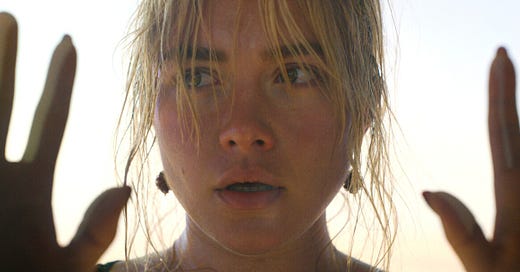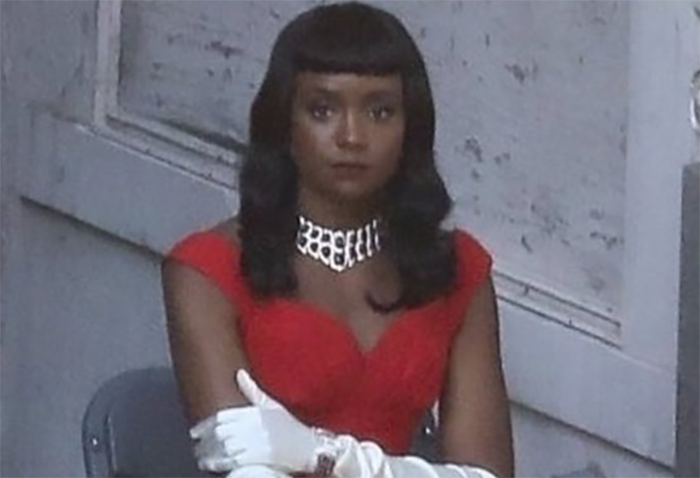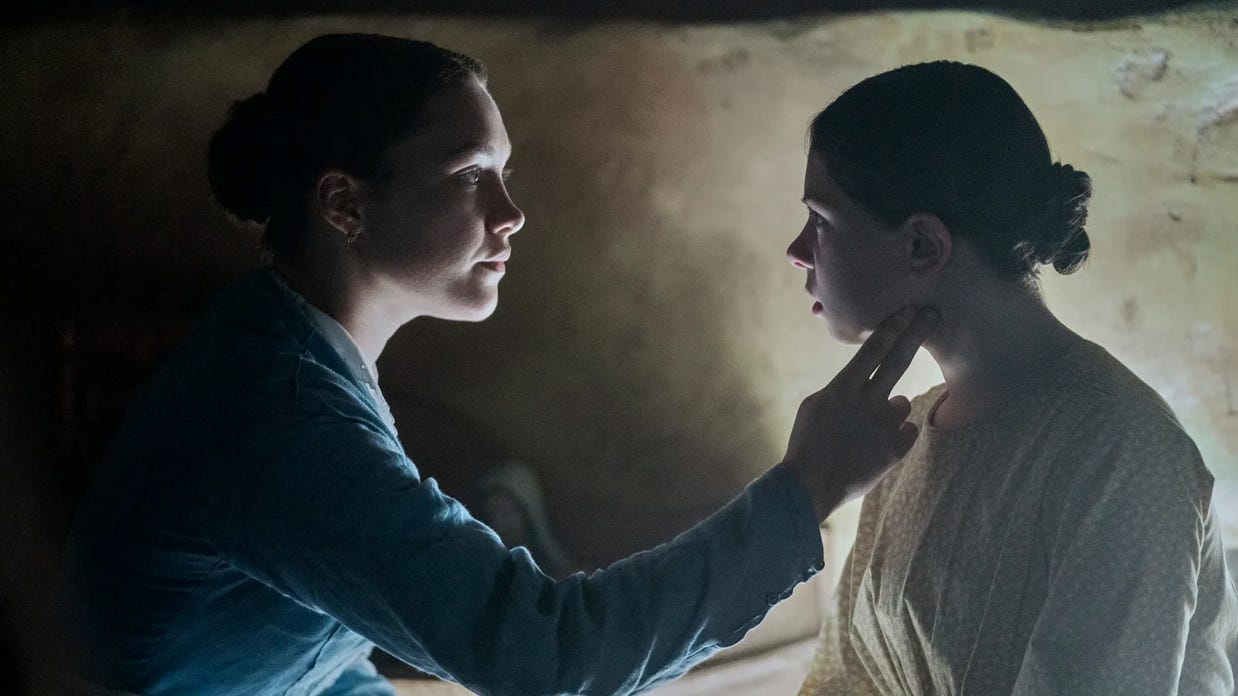THB #215: A Queen Dies, A Queen Lives - A Tale of 2 Pughs
In the last 5 days, I have witnessed 2 Florence Pugh films. They both are weighted on her shoulders to the extreme. They both offered unique Pugh performances. They both left you appreciating the level of craft of which she is capable.
That’s about all that connects them, aside from timing.
The one getting the most attention is Don’t Worry Darling, which is a disaster of the highest order. The genius of Matty Labatique is the true star of the movie. One must give Olivia Wilde credit for the conception of the imagery. But more often than not, the lighting is wininng over inexperienced directing when it comes to those flashy visuals.
But the big problem with the film is, as usual, the screenplay. Every film lover recognizes previous films that told similar stories and I won’t bother rolling out for you here… because they are ultimately irrelevant. It’s 2023, even if the movie is set in some version of 1953. And we know a third act twist when it’s coming.
Don’t Worry Darling lingers in what it seems to think is its strength for 2 full acts and once the twist lands, its exploration is so meager that there is little scraped from the bones of the ideas. The entire film is a good first act of another movie.
What floated into my head in the 2nd act of the film was HBO’s Westworld. This movie is pretty similar - structurally - to the first season of the series. And while there may be more seasons of Westworld than we actually needed, that first season was the set-up for the complex exploration of ideas that the series became. (Richard Benjamin starred in the 1973 movie Westworld… his wife Paula Prentiss starred in 1975’s The Stepford Wives. Hmmm…)
You can feel the movie aching to take itself more seriously. But instead of just getting to it, it is so busy trying to Shyamalan it, it keeps squeezing the gimmick to near the very end, and what should have been a smart engagement becomes a quite shitty action movie.
What is so frustrating is that it’s all there, begging to be explored. Pugh’s Alice, obviously. But we know just enough to be intrigued and not nearly enough to be satisfied from Wilde’s Bunny and Gemma Chan’s Shelley and barely get any value from Kate Berlant’s Peg or Sydney Chandler’s Violet.
The standout oddity in the film is Kiki Layne and her Margaret. She’s Black. What is the text? What is the subtext? Her character sees the twist - which still won’t land for another act - sooner than anyone else. Why her?
Here’s the thing… I have zero issue with Margaret being Black or the character, if race-free in the script, being played by a Black actress. But it has to have meaning. The world of this movie, presumably in the 1950s, has only 3 people of color, the Black couple and one Indian male. If you make this choice, you are obliged to offer the context. More so, like other unexplored ideas in the film, it is the flavor of a film like this. We have seen the broad strokes in other movies a million times. We are hungry for more.
Again, this is the problem with holding the twist so long. I am sure that the writers have a context and a reason for this. They just don’t have any time to explore it once they twist.
The men in the film are almost completely worthless. You can see something remarkable Chris Pine in his Frank… but the script keeps turning him into a caricature. It hurt me to watch Nick Kroll, who is capable of delivering as a draamtic actor, being used as nothing more than comic relief.
Harry Styles is not an actor and whatever you think of his relationship with the director, she shoots him like an object, not an actor. He finally gets a couple moments of real emotion. And he’s okay. But the character, who could have been complex - like much of the movie - is not. In the way things are laid out, he is the true emotional center of the film… the driver of his story with his wife. But the character does not rise to the occasion.
Not to get too deep back into the drama of this whole thing, but having seen the film, I can see why Shia LaBeouf wanted some serious rehearsal… because the actors could have brought another layer of depth that is not in the script by working together.
I sat through the movie, waiting for something I couldn’t anticipate to happen. And the twist is, I suppose, unexpected. But after it is what it is and not something we have exactly seen before, one quickly realizes that we have seen it before in other contexts… but with more definition.
At the end of a movie like this, you should feel excited and enraged and compelled to discuss it. But you’re not. My wife and I were frustrated as I wanted to dig into the film and she was interested only in how much of a reflection of historically bad male behavior the movie was and was not. She was deeper into the subtext than the movie was. Oy.
Now on the other hand… one of the delights of Telluride was a little Netflix movie called The Wonder. I liked it when I saw it… and it’s grown on me since.
Sebastián Lelio, who you should know from 2017’s A Fantastic Woman, directs and co-writes with Alice Birch from the Emma Donoghue novel. Birch worked on Succession, but in the twisty world of show biz, worked with Lenny Abrahamson on Normal People, and Lenny directed Donoghue’s Room, which the novelist wrote for the screen herself.
The “wonder” of the title is a young girl in a small village in 1862 who has stopped eating for 4 months with no ill effects. (You may find multiple wonders… but let’s start here.) They village elders call for a nun and a nurse to come watch the girl 24 hours a day to prove or disprove what seems to be a miracle.
Keep reading with a 7-day free trial
Subscribe to The Hot Button by David Poland to keep reading this post and get 7 days of free access to the full post archives.






